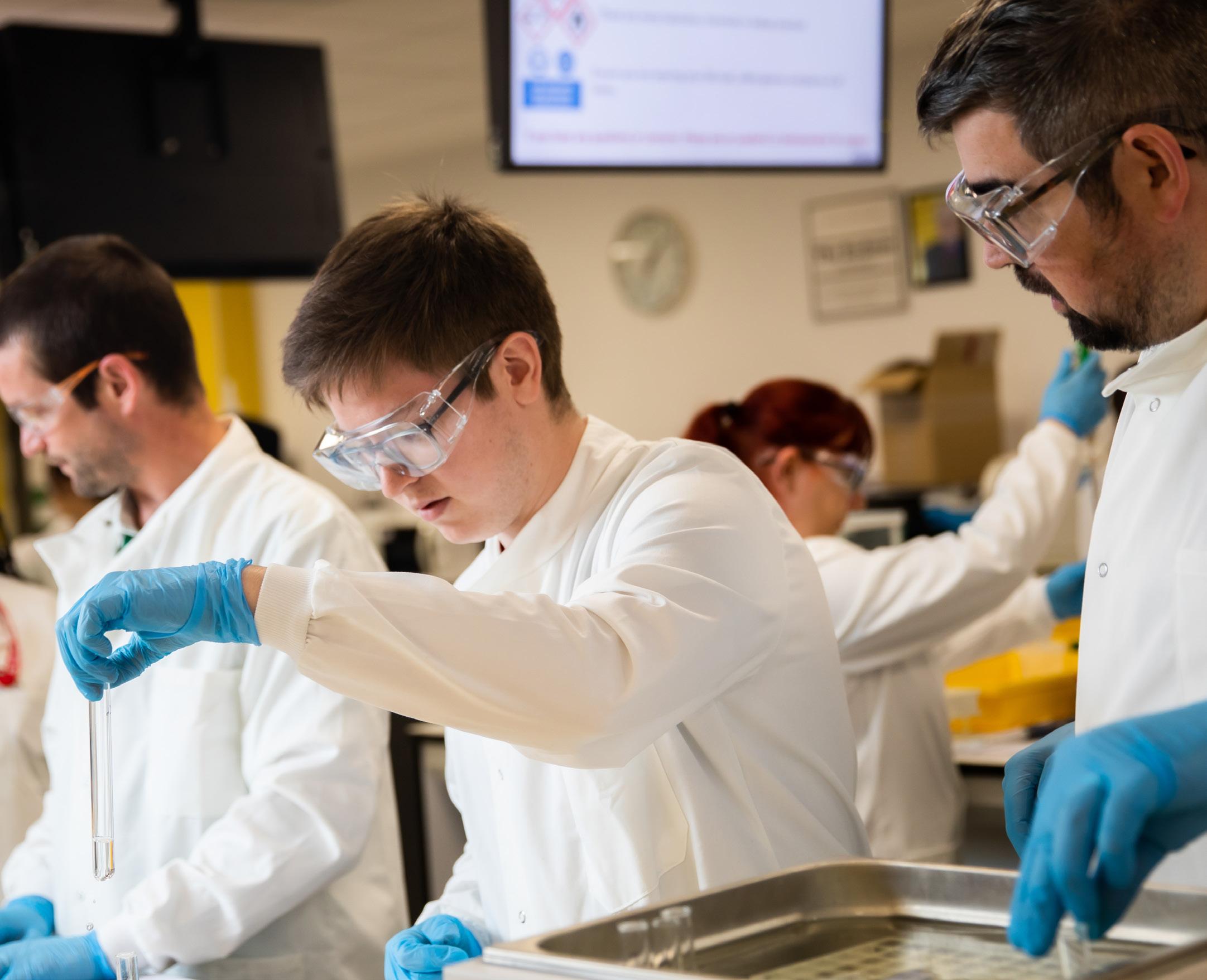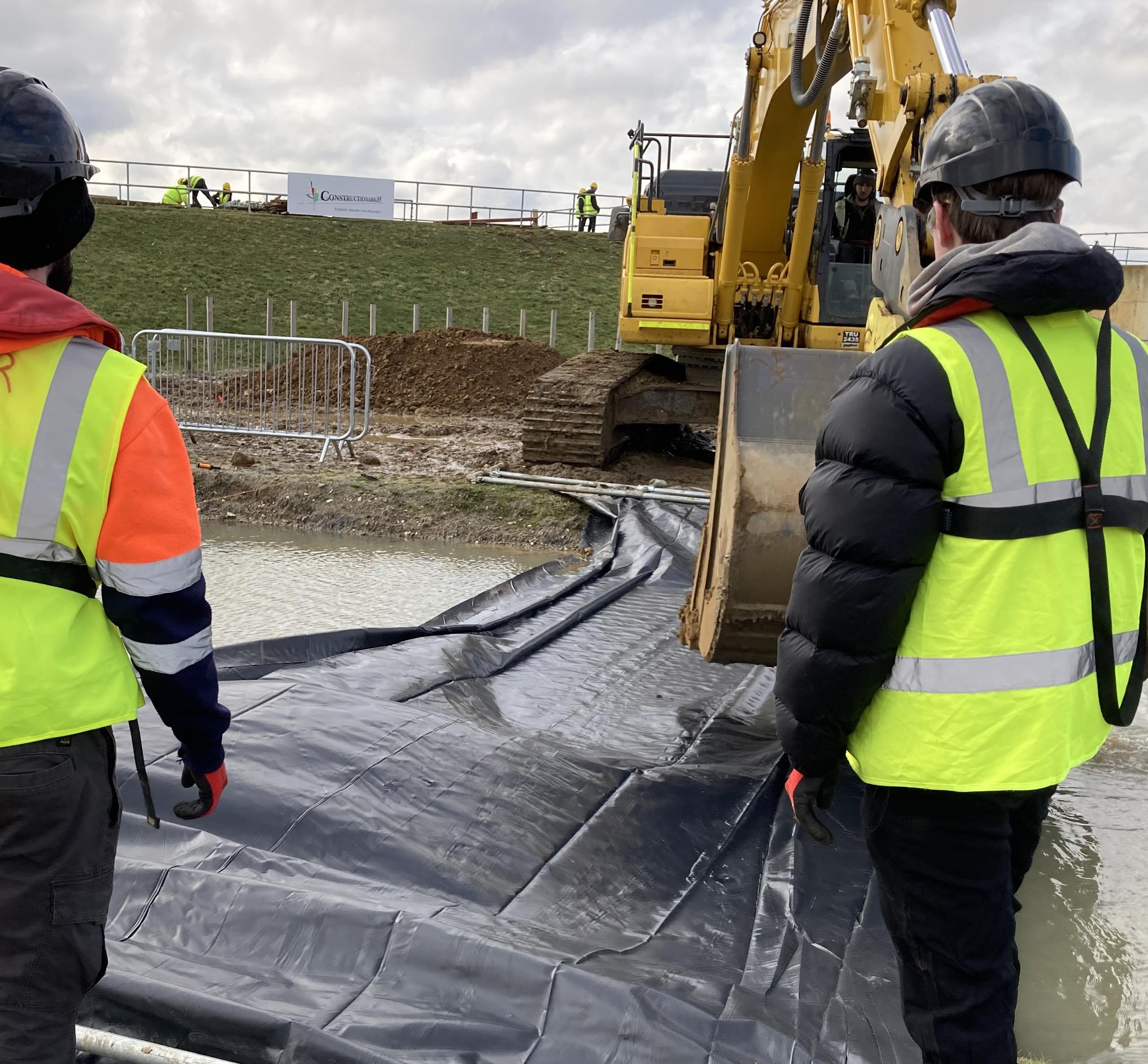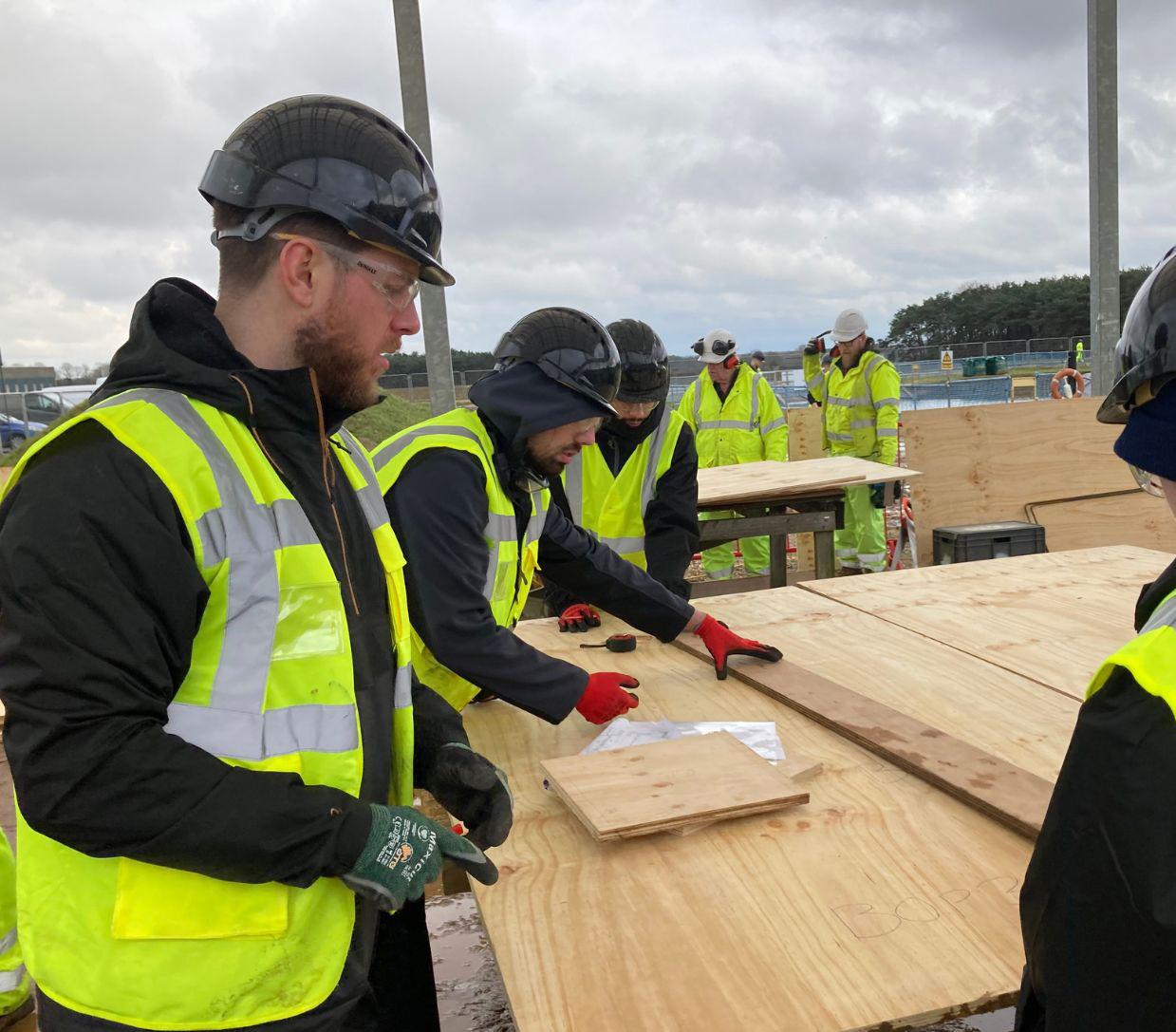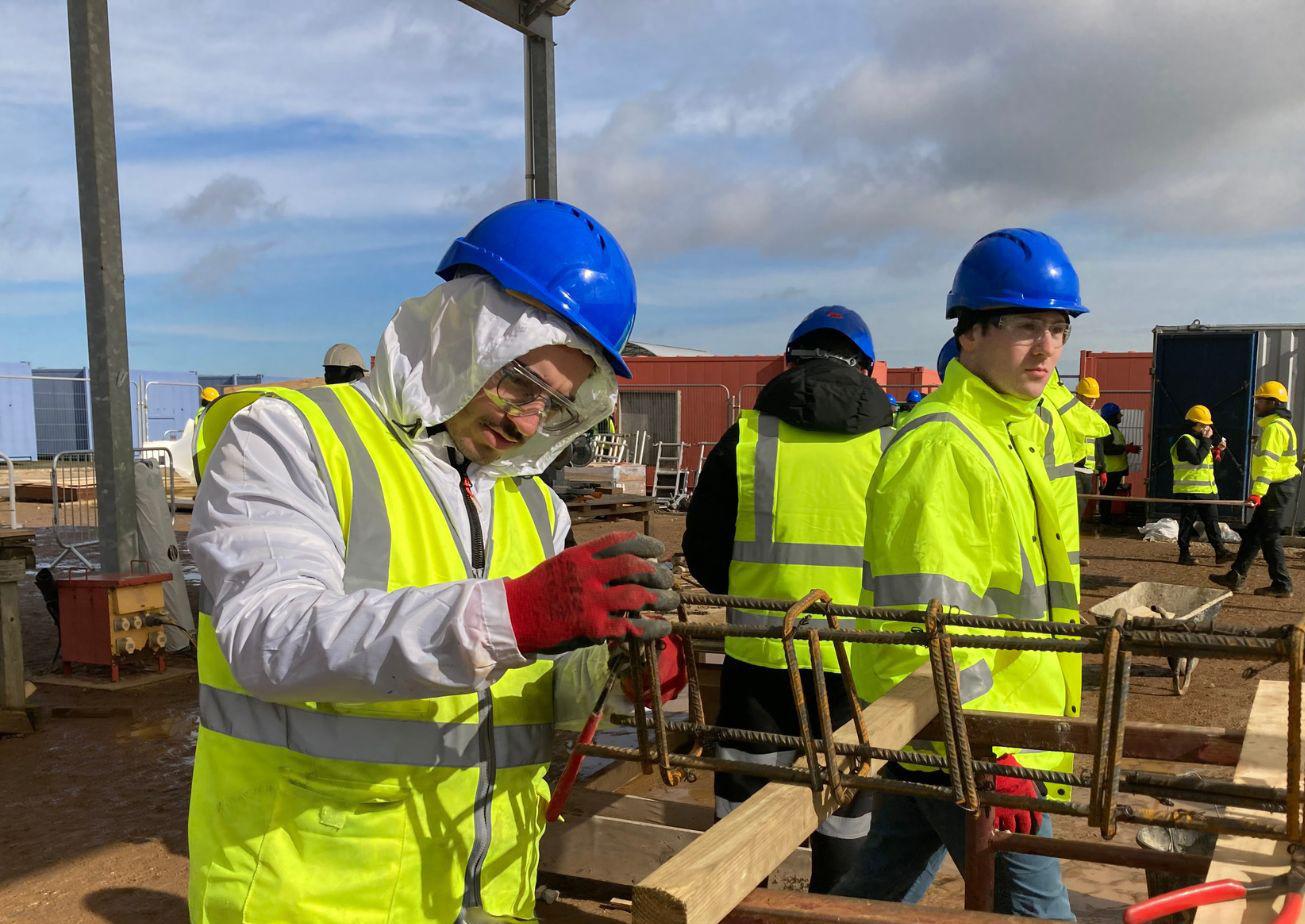APPRENTICESHIPS


SCIENCE, ENGINEERING AND ENVIRONMENT





The School of Science Engineering and Environment offers a broad portfolio of apprenticeships, all developed in line with vocational sector requirements and utilising our wealth of academic expertise. Programmes include Chartered Surveying (3 separate paths), Construction Site Supervisor, Construction Site Management, Civil Engineering, and Healthcare Science Practitioner. We take pride in working with industrial partners to grow apprenticeships to meet their needs, upskill and strengthen their workforce, and widen opportunities for employees to progress their careers.
Apprentices, their employers and the University form a tripartite agreement which underpins the schedule for learning throughout the apprentice journey. Apprentices often study alongside full-time university students, while benefitting from workplace-based learning which is integrated within the structure of their programme. This approach adds depth and richness to the shared student experience and opens opportunities for wider networking and integration into the university community. Experts in their field, both university staff and employer supervisors, support apprentices through their journey as they build their professional practice portfolio, from the very first day through to their End Point
Assessment (EPA). For most programmes, the EPA is the professional qualification needed to demonstrate vocational competence, ensuring employers gain employees who are fit for practice and confident members of their team. This makes Salford a great choice for employers and applicants

As Head of Apprenticeships for SEE, I am responsible for facilitating the growth of our apprentice provision and ensuring our programmes are of suitable high quality and value for money for our industrial partners and their employees. This brochure outlines the range of apprenticeship programmes and details of the vocational skills and professional qualifications gained with each. I hope it is useful for making your selections to enhance your workforce with the University of Salford, and we welcome discussion for future developments.
Dr Lucy Smyth Head of Apprenticeships – School of Science Engineering and Environmentl.smyth@salford.ac.uk
Make the most of government funding via levy: use it or lose it
Improve your service by offering cost-effective training that employers have co-designed: occupational competence
Invest in your existing workforce and attract talent: motivate and retain your employees
Support employees to develop knowledge, skills and behaviours that are directly relevant to the organisation: boosting productivity
Develop high calibre staff: creating an engaged and loyal workforce
/ Earn while you learn: in an industry that is committed to developing its employees
/ Receive recognised qualifications: an opportunity to study at university
/ Benefit from ongoing and personalised support from leading industry and academic professionals
/ Gain real work experience: improve your employability
The Apprenticeship Services Unit at the University of Salford is here to support you throughout your apprenticeship journey. From admissions and onboarding to ongoing support throughout the apprenticeship, we are here to make the process as smooth as possible. We can even help you to advertise your vacancies if you are looking to recruit new staff. We’re a small team but we are all passionate about what we do and committed to ensuring both you the employer and the apprentice themselves have the best possible experience.
Get in touch today to find out how we can help develop your workforce.
Email: apprenticeships@salford.ac.uk Website: salford.ac.uk/apprenticeships Phone: 0161 295 3063 Twitter: @UoS_Apprentice
We offer a range of apprenticeship programmes from Level 4 through to degree level (Level 6). Each apprenticeship programme will have different entry requirements and a funding band allocated to it. The key to the success of our apprenticeship programmes is their flexible delivery models. We recognise the need for apprentices to be applying their developing knowledge, skills and behaviours and have therefore developed delivery models to reflect this. There will be a range of assessment methods depending on the programme. These may include examinations, essays and presentations etc. There will also be an End Point Assessment (EPA) which is a holistic and independent assessment of the knowledge, skills and behaviours which have been learnt throughout the apprenticeship. An apprentice can only take the EPA once they have met the minimum duration of an apprenticeship, satisfied the gateway requirements (e.g. confirmation of Level 2 English and maths and the degree certificate) set out in the assessment plan and you (in consultation with the training provider) are in agreement they have attained sufficient skills, knowledge and behaviours. View our apprenticeship programmes here: salford.ac.uk/apprenticeships




Why did your organisation choose the University of Salford as your apprenticeship provider?
The University provide a high-quality and dedicated apprenticeship programme which is fully integrated and supportive in its mentorship and involves the mentors within our organisation ensuring a successful outcome for all.
What are the main benefits of hiring an apprentice?
The apprentice is keen and unbiased and provides a new and fresh outlook on our process and procedures, offering a new perspective which improves our practices and methods. It is valuable also for our mentors and line managers to learn from the apprentice. To bring in and grow a person is an opportunity and a privilege and provides for an all-around committed and professional employee.
As an employer, how have you found the training and support provided by the University of Salford?
Excellent, a very thorough, structured and fully interactive programme for all parties involved. There has always been great communication and follow-up with fully documented and explained processes.
Sadie Wallington Senior Commercial Manager NG BaileyQuestion is repeated.
The BSc (Hons) Biomedical Science (pathology lab-based) degree has been developed through consultation with pathology laboratory employers and is co-delivered, meeting the requirements for a Healthcare Science Practitioner (Biomedical Scientist) apprenticeship through completion of an approved Biomedical Science degree. The apprenticeship route integrates traditional academic learning on a degree programme with work-based learning through employment in a suitable approved pathology laboratory. It provides a new route for developing and retaining the future pathology laboratory workforce that is complementary to the academic route, ensuring that graduating apprentices are competent Biomedical Scientists, able to meet the future needs of employers.
To undertake this programme, the applicant will already be employed in a pathology laboratory (which holds Institute of Biomedical Science (IBMS) pre-registration training approval), perhaps as a medical laboratory assistant or similar role,
and aspire to have a career as a Biomedical Scientist. The University of Salford apprenticeship degree programme is designed to work in partnership with pathology laboratories so that the apprentice can complete their studies whilst continuing in their usual role.
Applicants must be employed in a pathology laboratory with current IBMS pre-registration training approval. The employing organisation will set the selection criteria for their apprenticeships. Academically, applicants registering for the programme will need to satisfy the relevant degree entry criteria.
Graduates will obtain a BSc (Hons) Biomedical Science (pathology laboratory based) degree. In addition, successful completion of the apprenticeship requires apprentices to pass an ‘end point assessment’ (EPA) which ensures suitability and competency for the role. Graduates from the apprenticeship programme will be eligible to register with the professional body and will be eligible to apply for statutory registration
with the Health and Care Professions Council (HCPC) as a Biomedical Scientist.
The apprenticeship takes three years to complete. The University of Salford has consulted with employers regarding the programme length and mode of delivery.
Apprentices will study between two to four different core and specialist modules at any one time from BSc (Hons) Biomedical Science. Please see website for full details.

Apprentices will need to attend University for the equivalent of approx. one day per week across three trimesters per year and apprentices will be expected to undertake significant additional learning online. It is suggested that a further 10% allowance be given by the employer for work towards completion of the IBMS registration portfolio.
Apprentices will take between 2-4 different core and specialist modules at any one time, with more modules being taken concurrently in the first year. In addition, work-based modules are taken at each level.
Apprentices will be assigned a specific academic tutor and will benefit from a workplace mentor and training programme.
This team will meet regularly and will support the apprentice’s studies and completion of the IBMS registration portfolio.
Modules are assessed by coursework and/or end of module examination. Apprentices will also complete an EPA which is integrated into their final work-based module and scaffolded by various methods of support from day 1.
The EPA consists of a readiness for practice written test, a professional discussion, and a verbal presentation of project research work. Prior to the EPA, the IBMS registration portfolio must be completed and verified in the workplace. The integrated nature of the programme ensures graduates are eligible to register with the HCPC and fit for practice as a band 5 Biomedical Scientist.
For further information on this apprenticeship please visit: salford.ac.uk/courses/degree-apprenticeship/ biomedical-science-healthcare-science-practitioner-degree
For full details including entry requirements and start dates, please contact the Apprenticeship Services Unit: apprenticeships@salford.ac.uk
The Chartered Surveyor Apprenticeship includes the RICS accredited University of Salford BSc Quantity Surveying degree qualification and full chartered membership of the Royal Institution of Chartered Surveyors (MRICS). There are two distinct components to the degree apprenticeship – the academic degree programme and the work-based assessment culminating in the completion of the RICS APC as the apprenticeship end point assessment. The University – as lead provider – is responsible for delivering the degree programme. The employer is responsible for delivering all work-based assessment components including the RICS APC.
Our courses are management focused; therefore, leadership skills and a hard-working approach are important. The built environment caters for many different skills from creativity and original thinking to efficiency and technical ability, so apprentices should be willing to develop in new areas. Most importantly we want the apprentice to have a real passion for developing, advancing and shaping the future of the built environment.
Applicants must be employed and individual employers will set the selection criteria for their apprenticeships. Academically, students registering for the programme will need to meet the relevant entry criteria. See website for further details.
Successful completion of the end point assessment will qualify the apprentice for Chartered Membership of RICS and will be undertaken by RICS itself.
The programme structure will be delivered to degree apprentices on a part-time, day-release basis over a 5-year period. For applicants who have achieved the level 4 outcomes via HNC in Construction or similar – could be awarded advanced entry to year 3 of 5 – subject to admissions approval.
Apprentices will usually study between one and two modules per Trimester. Please see website for full details.
Apprentices will study on a day-release basis, coming on to campus one day a week studying two trimesters out of three. In addition to the degree component, apprentices will complete continuous, work-based assessment of the knowledge they acquire on the degree programme.
Each module will be assessed continuously using a range of methods, for example examination, essay and presentations. The end point assessment (EPA) is the final assessment for the RICS Assessment of Professional Competence (APC) for the Quantity Surveying and Construction pathway. The APC comprises a presentation and interview, a substantial summary of the apprentice’s experience, a case study and the CPD diary of activities undertaken across the entire degree apprenticeship programme.
For further information on this apprenticeship please visit: salford.ac.uk/courses/degree-apprenticeship/quantitysurveying-chartered-surveyor-degree-apprenticeship

For full details including entry requirements and start dates, please contact the Apprenticeship Services Unit: apprenticeships@salford.ac.uk

The Building Surveyor Apprenticeship includes the RICS accredited University of Salford BSc Building Surveying degree qualification and full chartered membership of the Royal Institution of Chartered Surveyors (MRICS). There are two distinct components to the degree apprenticeship – the academic degree programme and the work-based assessment. The University – as lead provider – is responsible for delivering the degree programme. The employer is responsible for delivering the work-based assessment components
Our courses are management focused; therefore leadership skills and a hard-working approach are important. The built environment caters for many different skills from creativity and original thinking to efficiency and technical ability, so you should be willing to develop in new areas.
Most importantly we want applicants to have a real passion for developing, advancing and shaping the future of the built environment.
Applicants must be employed and individual employers will set the selection criteria for their Apprenticeships. Academically, students registering for the programme will need to meet the relevant entry criteria. See website for further details.
Successful completion of the end point assessment will qualify the apprentice for Chartered Membership of RICS and will be undertaken by RICS itself.
The programme structure will be delivered on a part-time, day release basis over a 5-year period. For applicants who have achieved the level 4 outcomes via HNC in Construction or similar – could be awarded advanced entry to year 3 of 5 –subject to admissions approval.
Apprentices will study between one and two modules per trimester depending on the number of years taken to complete the degree. Please see website for full details.
Apprentices will study on a day-release basis, coming on to campus one day a week studying two trimesters out of three. In addition to the degree component, apprentices will complete continuous, work-based assessment of the knowledge they acquire on the degree programme.
Each module will be assessed continuously using a range of methods, for example examination, essay and presentation. The end point assessment (EPA) is the final assessment for the RICS Assessment of Professional Competence (APC) for the Quantity Surveying and Construction pathway. The APC comprises a presentation and interview, a substantial summary of the apprentices’ experience, a case study and the CPD diary of activities undertaken across the entire degree apprenticeship programme.

For further information on this apprenticeship please visit: salford.ac.uk/courses/degree-apprenticeship/buildingsurveying-chartered-surveyor-degree-apprenticeship
For full details including entry requirements and start dates, please contact the Apprenticeship Services Unit: apprenticeships@salford.ac.uk
Delivered over five years, our BSc (Hons) Real Estate Development and Management Degree Apprenticeship course blends theoretical knowledge with applied professional skills and competencies.During studies, apprentices will experience academic seminars and tutorials to build their knowledge. They will also experience project work with other built environment students, mirroring the collaborative approach of modern property and construction industries.
We have shaped the learning experience so that apprentices gain relevant knowledge and technical skills, but also transferable career skills that are highly sought by industry. We are proud that our Real Estate Development and Management degree apprenticeship is accredited by the Royal Institution of Chartered Surveyors (RICS).
All of our courses are management focused; therefore leadership skills and a hard-working approach are important. The built environment caters for many different skills from creativity and original thinking to efficiency and technical ability, so the applicant should be willing to develop in new areas.
Most importantly we want apprentices to have a real passion for developing, advancing and shaping the future of the built environment.
Applicants must be employed and individual employers will set the selection criteria for their Apprenticeships. Academically, students registering for the programme will need to meet the relevant entry criteria. See website for further details.
Successful completion of the degree element will qualify the apprentice for the BSc (Hons) Property and Real Estate and successful completion of the End Point Assessment (EPA) will qualify the apprentice for Chartered Membership of RICS. The EPA is administered by RICS itself.
The programme structure will be delivered to degree apprentices on a day-release basis over a 5- year period, subject to agreement by the employer and the university. For instance apprentices can take advantage of enrolling on the University of Salford’s unique accelerated day-release
programme, completing their full degree within three years or they may decide with their employer to complete the degree on a part-time basis over five years.
Apprentices will generally study two modules per trimester though this varies depending on whether the accelerated or 5-year day-release is selected. Please see website for full details.
During each trimester of study, apprentices will attend timetabled classes one day per week at the University of Salford’s Peel Park campus.

In addition to the degree component, apprentices will complete continuous, work-based assessment of the knowledge they acquire on the degree programme.
This will be overseen by the employer, who will appoint members of staff to support the apprentice in completing these elements. This work will be evidenced via a diary and a log book of experiences gained at university and in the workplace.
Each module will be assessed continuously using a range of methods, for example examination, essay and presentation. The End Point Assessment is the final assessment for the
for the Commercial Property, Residential Property and Valuation pathways. The APC comprises a presentation and interview, a substantial summary of the apprentice’s experience, a case study, diary of activities undertaken across the entire degree apprenticeship programme and a log of all CPD undertaken.
For further information on this apprenticeship please visit: salford.ac.uk/courses/degree-apprenticeship/real-estatedevelopment-and-management-degree-apprenticeship
For full details including entry requirements and start dates, please contact the Apprenticeship Services Unit: apprenticeships@salford.ac.uk
This apprenticeship is for individuals wanting to pursue a career in construction or property, returning to education or want to develop their current career in the built environment sector. Apprentices can complete their Construction Site Supervisor apprenticeship if they are currently in full-time employment with a qualifying organisation.
The HNC construction is aligned to the requirements of a professional career in the built environment as a Construction Site Supervisor, and helps apprentices learn the technical and practical skills needed to satisfy industry and employer needs.
Delivered by one of the UK’s leading centres for built environment education, apprentices will study a wide range of construction and property-related topics. On successful completion, individuals will have an industry recognised qualification which will support their future career development. They will also have the option of progressing onto the Construction Project Management degree upon completion of the HNC.
This Apprenticeship is for those currently employed in the construction industry, who are seeking a fascinating future in a sector that provides responsibility and real-world impact. Applicants will be passionate about new technologies in construction and how they are applied in the built world sector.
Applicants must be employed, and individual employers will set the selection criteria for their Apprenticeships. Academically, students registering for the programme will need to meet the relevant entry criteria. See website for further details.
Graduates from this programme will receive an apprenticeship in HNC Construction.
The Construction Site Supervisor apprenticeship is completed within the HNC Construction programme taking two years of part-time study, on campus 1 day per week for in-person
participation. This enables apprentices to work and study at the same time as completing their HNC Construction and Construction Site Supervisor apprenticeship

Both full-time and part-time students complete the same modules, with full-time students undertaking all six in their year of study, whilst the part-time apprenticeship students complete 3 modules per year during their two years of study. Please see website for full details.
Apprentices will develop their knowledge and skills using a blend of theoretical, collaborative and practical methods. These include lectures and tutorials, project work, (both individual and group-based), directed study, one-to-one tutorials (by appointment) and guest lectures and site visits
Apprentices will be assessed using a combination of methods, including exams, projects and written coursework. Coursework is problem-focused and may typically involve case study analysis and/or essay writing.
The apprenticeship non-integrated End Point Assessment (EPA) will be conducted by the Chartered Institute of Building (CIOB) and this will comprise of submissions of project, portfolio of evidence, knowledge test and a professional
discussion. This will typically take place in the June / July of the second year of study enabling progression to the BSC (Hons) Construction Project Management in September of the same year.
For further information on this apprenticeship please visit: salford.ac.uk/courses/apprenticeship/hnc-constructionconstruction-site-supervisor-apprenticeship
For full details including entry requirements and start dates, please contact the Apprenticeship Services Unit: apprenticeships@salford.ac.uk
Delivered over three years, with entry point at Level 5, the Construction Site Management Degree Apprenticeship includes the mandated BSc (Hons) Construction Project Management Degree. It blends theoretical knowledge with applied professional skills and competencies
During the programme, apprentices will control the construction process, balance time, quality and resources to bring new developments to life. Apprentices will gain the skills to successfully plan, manage and implement decisions and processes that keep built environment projects on track. They will work on behalf of contracting organisations or representatives of the client, aiming to deliver a high-quality project to realise the client’s expectations.
Accredited by both the Royal Institution of Chartered Surveyors (RICS) and the Chartered Institute of Building (CIOB), applicants will be educated to the highest industry standards. Guided by expert and industry-experienced staff, apprentices will study a range of modules, designed to develop their professional, technical and interpersonal skill set so you are ready to build a rewarding career in the built environment.
This apprenticeship is for individuals who want to successfully plan, manage and implement the decisions and processes that keep built environment projects on track. It is for individuals who are employed in practice.
Applicants must be employed and individual employers will set the selection criteria for their Apprenticeships. Academically, students registering for the programme will need to meet the relevant entry criteria. See website for further details.
Upon successful completion of the course, apprentices will achieve a BSc Hons in Construction Project Management and professional registration with CIOB as well as the mandated Site Safety Plus Site Managers’ Safety Training Scheme and Site Environmental Awareness Training Scheme.
The typical duration for this apprenticeship is three years and is delivered on a part-time mode of delivery.
Delivered part-time over three years via a programme of practice-focused modules, this course provides the ideal balance of academic study with the application of professional skills and competencies, mirroring the multidisciplinary, teambased approaches used in modern construction. Please see website for full details.

Apprentices will be taught through a combination of lectures, seminars and tutorials. Seminars enable apprentices to discuss and develop their understanding of topics covered in lectures in smaller groups. In addition, apprentices will have timetabled meetings with their personal tutor.

Apprentices will participate in off-the-job training for one day per week during their studies with work-based learning being supported as part of their work commitment.
Students will engage in a variety of learning techniques such as formal lectures to primarily transfer core knowledge and information, tutorials to further explore deeper learning and explore new concepts and theories. Group work sessions, communication and collaboration activities to develop problem-solving skills and application of knowledge to allow contextualisation of theory and practice on a practice-based example, and the development of interpersonal and articulation of both technical and verbal skills.
Assessment methods will include written examinations and a range of coursework assessments such as essays, reports, portfolios, performance, presentations and final-year major project. The grades from formal assessments count towards the apprentice’s module mark.
For further information on this apprenticeship please visit: salford.ac.uk/courses/degree-apprenticeship/bsc-honsconstruction-project-management-degree-apprenticeship For full details including entry requirements and start dates, please contact the Apprenticeship Services Unit: apprenticeships@salford.ac.uk
The Civil Engineer Degree Apprenticeship includes the Joint Board of Moderators (JBM) accredited University of Salford BEng (Hons) Civil Engineering degree and a Professional Review with either The Institution of Civil Engineers (ICE) or The Institution of Structural Engineers (IStructE).
This apprenticeship is a combination of an academic programme and work-based learning. The University is responsible for the degree programme, and the employer is responsible for delivering the work-based learning. The apprentice is employed throughout the process of completing the degree and the professional review.
Civil Engineering is a very broad industry, which stretches from transport systems (roads, ports and airports, railways and transit systems) through structures to water systems (water treatment and potable). We are looking for applicants who have a keen desire to follow a career in Civil Engineering. Good interpersonal skills and a strong work ethic are desirable. Applicants should have a good understanding of linking theory to real-life applications and an attention to detail.
Applicants must be employed full-time in a relevant role and the employer must be willing to sponsor the apprentice in order for them to study the apprenticeship programme. See website for full details.
Successful apprentices will be awarded an accredited BSc (Hons) Civil Engineering degree and simultaneously complete a training agreement with their employer, which will lead to a professional review with either ICE or IStructE.
Successful completion of the professional review will lead to Incorporated Civil Engineer (I.Eng MICE) or Incorporated Structural Engineer (I.Eng AMIStructE) status.
The degree is a part-time five-year programme (assuming the apprentice has relevant experience that can be used to provide some credit for Level 4 modules).
The end point assessment (EPA) process is likely to add a further year and is dependent upon the engineering institution.
The programme is composed of six modules per year, which are designed to meet the accreditation requirements of the Joint Board of Moderators (JBM). Each year involves modules which address the JBM themes of design, sustainability, health & safety risk management and creativity. Please see website for full details.
The majority of the programme will be delivered using inverted teaching techniques. Learning material will be available on the universities virtual learning environment; apprentices will be given a module handbook which sets out the learning timetable, and formative and summative assessments.
Class contact will be one day per week, when apprentices will be engaged in applying their knowledge and understanding.
A design exercise will be run and mentored by engineers in the employer’s organisation across the summer period.
Assessments will be identical to those undertaken by fulltime degree students. Every module involves a year-long design exercise, which is a group-based activity covering all the knowledge acquired that year. Additionally, each module is assessed by either an end examination or a portfolio of coursework.
The endpoint assessment (EPA) is a professional review (an oral examination) organised by ICE or IStructE. This is in the form of an interview with two professionally qualified engineers appointed by the engineering institution. The University will organise professional review preparation classes for apprentices who have completed their degree.
For further information on this apprenticeship please visit: salford.ac.uk/courses/degree-apprenticeship/civilengineering-civil-engineer-degree-apprenticeship
For full details including entry requirements and start dates, please contact the Apprenticeship Services Unit: apprenticeships@salford.ac.uk

For employees who already work within your company and those who are new to the role, there are a number of entry criteria set by both the government and by the University which individuals need to meet in order to undertake an apprenticeship programme.
To be eligible, apprentices must:
/ Have the right to work in England
/ Spend at least 50% of their working hours in England
/ Work for you, a connected company or connected charity as defined by HMRC
/ Be employed in a full-time role and work a minimum of 30 hours per week
/ Be employed in a relevant role to the apprenticeship programme they are applying for
/ Meet the standard academic entry requirements of the programme (this may include A Levels, BTECs, undergraduate degree etc.)
/ Hold maths and English at Level 2 and have the required certificates upon application www.gov.uk/government/publications/english-and-maths-requirements-inapprenticeship-standards-at-level-2-and-above
Apprenticeships must last a minimum of 12 months and involve at least 6 hours per week off-the-job training. This 6 hours per week off-the-job training requirement is measured over the course of an apprenticeship. The off-the-job training is an essential part of an apprenticeship and therefore must take place during paid working hours.
Off-the-job training is defined as learning which is undertaken outside of the normal day-to-day working environment and leads towards the achievement of an apprenticeship. This can include training that is delivered at the apprentice’s normal place of work but must not be delivered as part of their normal working duties. The off-the-job training must be directly relevant to the apprenticeship standard, teaching new knowledge, skills and behaviours required to reach competence in the particular occupation.
/ The teaching of theory (lectures, simulation exercises, online learning etc.)
/ Practical training (shadowing, mentoring, industry visits, attendance at conferences)
/ Learning support and time spent writing assignments
/ Progress reviews
/ Training which takes place outside of apprentice’s paid working hours
/ Training to acquire skills, knowledge and behaviours that are not required in the apprenticeship standard
All off-the-job training must take place during paid hours. Apprentices may choose to spend additional time on training outside their paid hours, but this must not be required to complete the apprenticeship.

We will provide a means of tracking the 6 hours per week off-the-job by way of an apprenticeship timesheet.
All apprenticeship standards have a funding band attached to them. There are 30 funding bands with the upper limit of the bands ranging from £1,500 to £27,000. The upper limit of the band represents the maximum amount of funds an employer who pays into the levy can use towards the apprenticeship. It also represents the maximum amount the government will co-invest for non-levy payers. You can find more information on the funding bands here:
www.gov.uk/government/ publications/apprenticeshipfunding-bands
Employers please email: apprenticeships@salford.ac.uk and we will send you our Request For Services (RFS) form to complete.
1 2 3
Once this has been completed, signed and returned, a joint interview can take place with the apprentice.
4
We will then send out a link to the online application, our admissions team will then check entry criteria.
We will send them the link to the onboarding system where we will conduct assessments of prior learning, experience and current level of maths and English. 5
Once all checks are complete, we will give a conditional offer and start to prepare the employer evidence pack, this includes the contract and this includes the contract, Apprenticeship Agreement and Training Plan.
How has employing an apprentice improved your organisation?
We currently have 328 apprentices employed in Laing O’Rourke and each and every one of them improves our organisation as they are essentially the future of it. Apprentices are a key part of our talent pipeline and as they develop in their journey, they bring enthusiasm and new ideas, whilst energising those who help them on their journey and give them a sense of pride to the business.
Why are construction apprenticeships so important?
Construction apprenticeships are essential to the industry and the UK Economy. Construction is something that touches everyone’s lives with its output, whether it’s the home we live in, the office we work in, the hospital we are born in or the stadium we watch sport in. To deliver this for us all, we need a continual pipeline of talent to grow in the industry and apprenticeships are key to this.
What advice would you give to other organisations who are thinking of hiring an apprentice?
You should have a clear vision of why you want to employ an apprentice and ultimately what is your end goal. Its also essential you understand the end point assessment and what it will take from all parties to ensure the apprentice can achieve what’s required. Apprenticeships need employers to provide the right experiences so that an apprentice can develop through experience and apply the knowledge they have learned at college or University, so that mapping exercise against the assessment plan is essential. It’s a fantastic opportunity to kick start a career and bring talent into your
business, but my advice would be to start with the end in mind and work back from that to ensure you have all the right people and policies in place to get to that end goal for every one involved.
What skills has your apprentice brought to the organisation?
Energy, enthusiasm, and a different view are the first things an apprentice brings to the organisation. The skills are developed on programme and then eventually assessed and approved through EPA. We identify the skills our organisation needs, then source the correct occupational standard and training provider to deliver these skills through the apprenticeship model.
Why is it so important to employ apprentices in your organisation?
It’s essential to continuously build skills capacity within our organisation. We have a broad age range and will always need to keep developing talent just to maintain current performance. However, we always need to look to the future and ensure we have new talent that could one day become our future leaders and apprenticeships play a key part in that
How has the University of Salford supported you when taking on an apprentice?
The University has supported Laing O’Rourke for several years as a trusted training provider in the region. We have our own recruitment team who liaise with the University during the recruitment phase to ensure any potential candidates have the entry-level criteria before we commit to an offer.
Scott Bell - Laing O’Rourke